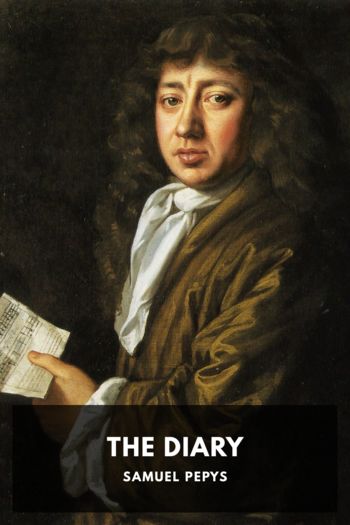The Diary, Samuel Pepys [e reader books TXT] 📗

- Author: Samuel Pepys
Book online «The Diary, Samuel Pepys [e reader books TXT] 📗». Author Samuel Pepys
There is a token of “Edmund Browne at the Pall Mall,” on which he describes himself as “Strong water man” (see Boyne’s Trade Tokens, ed. Williamson, vol. i, 1889, p. 694). ↩
Charles X, Gustavus, King of Sweden, died on February 3rd, 1659–60 (see March 8th). ↩
Orpheus’ hymn, “King of Heaven and Hell and Sea and Earth,” by Henry Lawes, is printed in The Second Book of Ayres and Dialogues. London (Playlord), 1655. ↩
The theorbo was a bass lute. Having gut strings it was played with the fingers. There is a humorous comparison of the long waists of ladies, which came into fashion about 1621, with the theorbo, by Bishop Corbet:
“She was barr’d up in whale-bones, that did leese
None of the whale’s length, for they reached her knees;
Off with her head, and then she hath a middle
As her waste stands, just like the new found fiddle,
The favourite Theorbo, truth to tell ye,
Whose neck and throat are deeper than the belly.”
↩
There is a token of the Salutation at Billingsgate (see Boyne’s Trade Tokens, ed. Williamson, vol. i, 1889, p. 531). ↩
The body of Poor Knights of Windsor was founded by Edward III. The intention of the king with regard to the poor knights was to provide relief and comfortable subsistence for such valiant soldiers as happened in their old age to fall into poverty and decay. On September 20th, 1659, a Report having been read respecting the Poor Knights of Windsor, the House “ordered that it be referred to a Committee, to look into the revenue for maintenance of the Poor Knights of Windsor,” etc. (See Tighe and Davis’s Annals of Windsor.) ↩
John Goods. He went to sea with Sir Edward Montagu. ↩
The Swiftsure was a second-rate of sixty guns, built at Woolwich in 1654 by Christopher Pett. ↩
The Nazeby was commanded by Captain, afterwards Sir Richard Stayner. It was a first-rate of eighty guns, built at Woolwich in 1655 by Christopher Pett. ↩
Major-General Overton was committed to the Tower in 1649, 1655, and in December, 1660. ↩
See note 359, where it is stated that Monk had dined at nine of the halls. ↩
Evelyn, about the same date (August 9th, 1661), “tried several experiments on the sensitive plant and humilis, which contracted with the least touch of the sun through a burning glass, though it rises and opens only when it shines on it.” ↩
The Angel tavern in King Street, Westminster. A token of this house, kept by Will. Carter, is described in Boyne’s Trade Tokens, by Williamson, vol. i, 1889, p. 647. ↩
The Cock alehouse at Temple Bar was originally called the Cock and Bottle, and dates back to the reign of James I. It was pulled down in 1882. There is a very scarce token of the house, dated 1665 (see Boyne’s Trade Tokens, ed. Williamson, vol. i, 1889, p. 762). ↩
The Sun Tavern behind the Royal Exchange was a famous house in its day. A token of it is described in Boyne’s Trade Tokens, by Williamson, vol. i, 1889, p. 591. It was rebuilt by John Wadlow after the Great Fire. ↩
Brampton in Huntingdonshire, where Pepys was probably born, and where his father afterwards retired. ↩
John Pepys, younger brother of Samuel; Paulina, sister of Samuel, afterwards Mrs. Jackson. ↩
Richard Hutchinson was Deputy Treasurer to Sir Henry Vane, whom he succeeded as Treasurer of the Navy in 1651. He continued to hold the office until the Restoration. ↩
There were several Dog taverns in London, but the one at Westminster mentioned by Pepys was the famous tavern in King Street, which was frequented previously by Ben Jonson. It was chiefly resorted to by Cavaliers. There is a token of the “Black Dogg” (see Boyne’s Trade Tokens, ed. Williamson, vol. i, 1889, p. 649). ↩
Charles X, Gustavus, son of John Casimir, Count Palatine of the Rhine. He succeeded his cousin Christina, who resigned the crown in 1654. ↩
The Painted Chamber, or St. Edward’s Chamber, in the old Palace at Westminster. The first name was given to it from the curious paintings on the walls, and the second from the tradition that Edward the Confessor died in it. ↩
This is the first notice in the Diary of the Navy Office in Crutched Friars. ↩
His father was a tailor, and this was his cutting-out room. ↩
Mr. Bowyer, of Huntsmore, Bucks, was an old friend of Pepys, and, according to a habit of the time, he sometimes styled him father (see November 7th, 1660). This misled Lord Braybrooke into supposing that he was Mrs. Pepys’s stepfather. ↩
Daniel Rawlinson, the Royalist host of the Mitre in Fenchurch Street. ↩
Thomas Hater appears to have been a clerk at the Navy Office before Pepys went there. In July, 1660, he became Pepys’s clerk; in 1674 he was appointed Clerk of the Acts, and in 1679 Secretary of the Admiralty. ↩
Huntsmore, a hamlet belonging to Iver, in which parish Robert Bowyer founded a free school about 1750. —Lysons’ Hist. of Bucks, p. 587 ↩
The Speaker was renamed the Mary after the Restoration. It was built at Woolwich by Christopher Pett in 1649. It was a third-rate of fifty-four guns and 395 tonnage.





Comments (0)